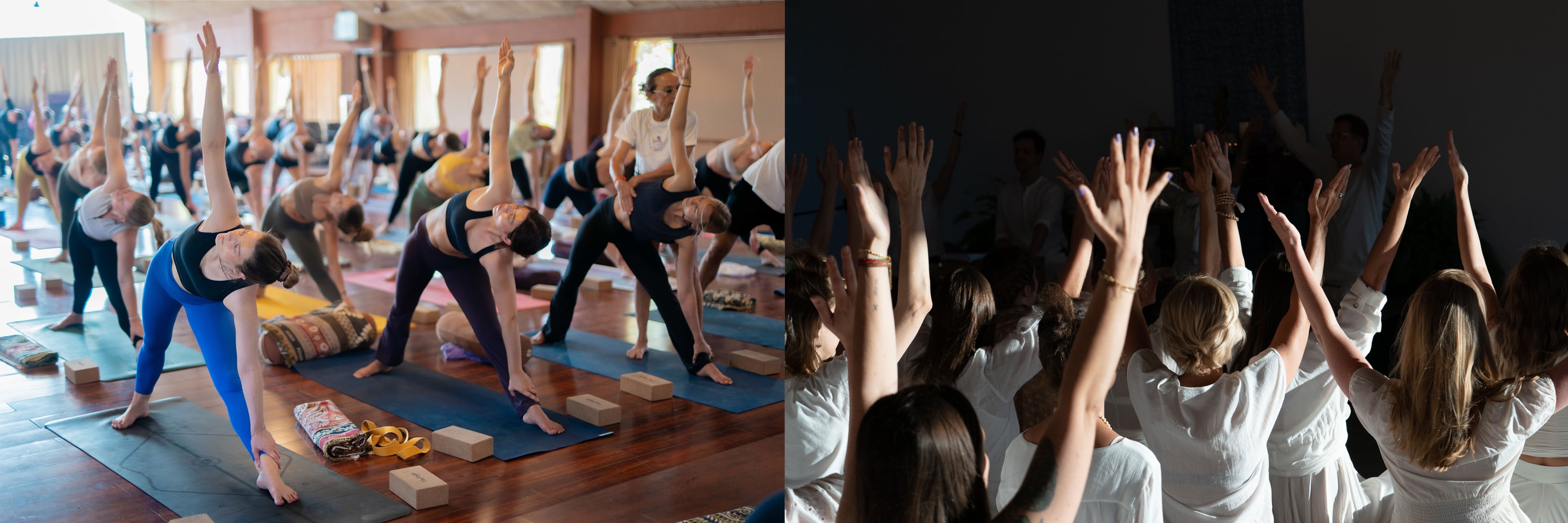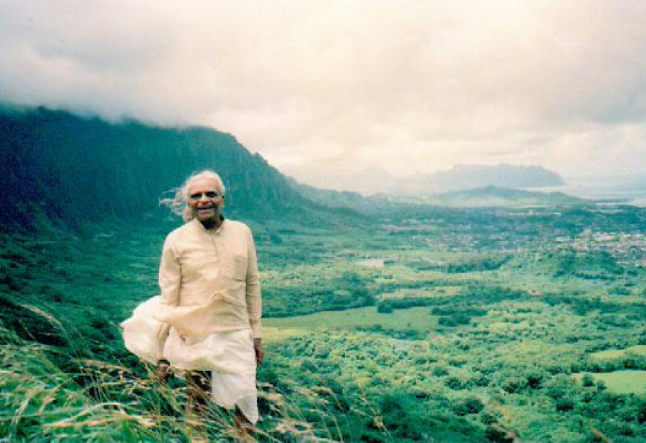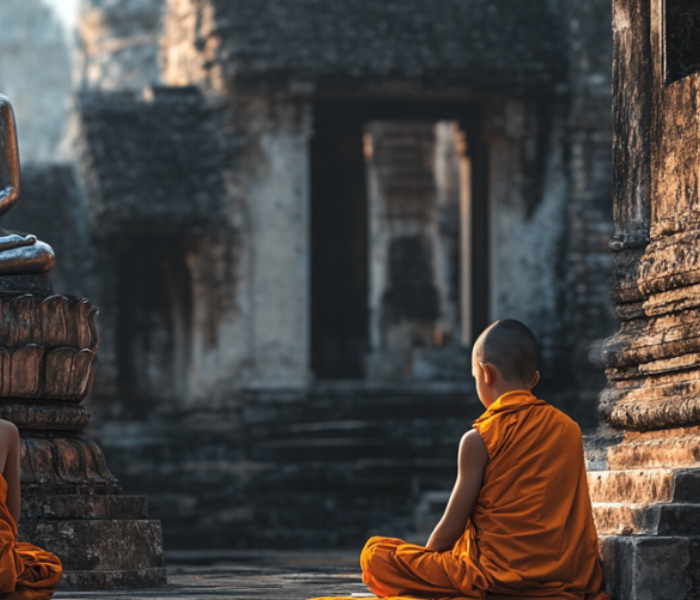The benefits of practicing Jivamukti Yoga

What is Jivamukti Yoga
Jivamukti Yoga is a respected and popular yoga method practiced worldwide, weaving ancient wisdom into the complexities of modern life. Jivamukti Yoga classes are taught under five guiding principles or tenets: Ahimsa (non-violence), Bhakti (devotion), Dhyāna (meditation), Nāda (sacred sound), and Shāstra (study of scripture).
Together, these tenets offer a path of spiritual awakening, inviting practitioners to live with awareness of how thoughts, intentions, and actions shape their lives and the world around them.
At its heart, Jivamukti Yoga uses the physical practice of āsana as a way to deepen our relationship with the Earth and with all beings.
This insight was central to co-founder Sharon Gannon’s vision, who understood yoga as more than movement, it is a transformational tool for cultivating compassion and embracing Ahimsa, extending non-violence to every form of life.
When we practice yoga asāna, the body becomes an instrument for spiritual transformation. The 5th century Sanskrit poet Kālidāsa establishes the importance of using the human body to live our dharma, our purpose, in this celebrated epic poem, Kumārasambhavam.
Sharīram Ādyam Khalu Dharma Sādhanam
शरीरम् आद्यं खलु धर्मसाधनम्
शरीरम् आद्यं खलु धर्मसाधनम्
This line from Kumārasambhavam, during a dialogue between Lord Shiva, disguised as a wandering ascetic, and Goddess Parvati, who is engaged in an intense penance to win his hand.
After asking about her well-being and whether she has the essentials to sustain such austerities, Shiva speaks this verse: “The body indeed is the primary means for the practice of dharma.”
Meaning
- Sharīram (शरीरम्) – the body
- Ādyam (आद्यं) – primary, first
- Khalu (खलु) – indeed, surely
- Dharma Sādhanam (धर्मसाधनम्) – the means or instrument for practicing dharma (righteousness, spiritual duty, or higher purpose)
Translation:
“The body indeed is the primary instrument for the pursuit of dharma.”
In yoga philosophy, this verse emphasizes that the physical body is not to be neglected or treated as an obstacle to spirituality, but rather as the foundation or vehicle through which higher purposes are realized.
Caring for, disciplining, and refining the body allows it to become a vessel for spiritual practice, ethical living, and compassionate action.
In Jivamukti Yoga, this teaching aligns the practice of āsana with ahimsā (non-violence) as expressions of respect for the body and for all sentient beings. An integral part of this practice is to be mindful of what we consume, for it is through this vessel that our dharma, our purpose can be realized.
The food we consume does not merely sustain us; it shapes our physical health, influences the clarity of our mind, and colors the quality of our spiritual practice.
When viewed in this light, it becomes clear why many spiritual practitioners approach eating with such deep care and reverence.
Attention is given not only to where and how food is prepared, but also to the integrity of its ingredients, the consciousness with which it is grown, and the degree of harm or exploitation that may have been involved in bringing it forth.
To eat in this way is more than a matter of diet, it is an ethical and spiritual choice, a way of aligning one’s life with the principle of ahimsa (non-violence) and honoring the sacred interconnection of all beings.
Jivamukti Yoga is an embodied practice that brings the practitioner to the sacred, where the body becomes both the foundation and the instrument for liberation. This is a method that honors the roots of classical yoga while opening it to modern seekers.
Through their practice, founders Sharon Gannon and David Life understood that the true meaning of asana, derived from the Sanskrit word meaning “seat” or “connection,” was not just about physical postures but about the relationship one holds with the Earth and with their individual soul in this life.
Over several decades, thousands of practitioners were drawn to Jivamukti Yoga and began embodying this purpose. As a result, many lives were changed, and Jivamukti Yoga became a movement that influenced everyday life, bringing issues like animal rights, environmentalism, and social justice into the mainstream of spiritual discourse.
It was a radical idea, especially in a culture heavily focused on exploiting the earth and other beings for human benefit.
Yet Jivamukti stood firm, and over time, a global shift in consciousness began to unfold, with Jivamukti playing a crucial part in that evolution. At the time of writing, there are now almost 3000 certified Jivamukti teachers (300 HR) globally, from over 30 countries.
There are also 1500 75HR program graduates from over 20 countries.

Origin
Jivamukti Yoga was founded in 1984 by Sharon Gannon and David Life in New York City.
It began as a movement within the New York City yoga community, which later inspired the establishment of famous Jivamukti Yoga School in New York, with a focus on compassion, spiritual study, and the practical application of yogic principles in daily life.
In Europe and the Americas now there are 21 official Jivamukti Yoga Centers where thousands of Jivamukti Yoga teachers and practitioners gather every week.
Sharon and David were inspired by the teachings of Shri Brahmananda Sarasvati, founder of Ananda Ashram in Monroe, NY. Jivamukti Yoga is a dynamic, holistic practice that integrates physical asana, devotional chanting, ethical living, scriptural study, and meditation into a full experience of the eight limbs of Yoga.
It also encourages the practitioner to think and act beyond the societal confines of accepting the status quo.
What distinguished Sharon and David’s journey was not only the depth of their personal practice but also the richness of their friendships, their scholarship, and the many associations that shaped their vision.
Over the years, they were guided and inspired by revered teachers and spiritual figures from diverse traditions, each leaving an imprint on what would become Jivamukti Yoga.
Among these influences, one particularly close association was with the renowned Bhakti practitioner Shyam Das of Woodstock.
Shyam Das, a teacher and practitioner of the Bhakti lineage of Pushti Mārg, a Vaishnava sect established in the 15th century by Shri Vallabhācharya, the last of the five great acharyas of India in modern times.
The Pushti Mārg tradition emphasizes an intimate, personal relationship with God, one that integrates devotion seamlessly into the fabric of daily life. Its practice does not treat God as distant or abstract, but as ever-present, woven into ordinary moments.
Through such devotion, one gradually purifies selfish tendencies and loosens the bonds created by false identifications with the transient.
The shifting and impermanent qualities of the external world lose their grip, and life takes on a quieter clarity.
Shyam Das often spoke of cultivating Sarva Ātma Bhāva—a state of consciousness in which one first perceives the unifying Ātma, the indwelling spirit, in all beings, before reacting to their passing outer forms. Such a vision arises not only from devotion, but also from grace, and from a sincere interest in spiritual life.
In this way, his teachings offered both Sharon and David a living example of devotion as liberation, and left a subtle but lasting influence on the ethos of Jivamukti Yoga.
Benefits of the Jivamukti Yoga practice
Jivamukti Yoga practice combines physical postures (asana), breathing techniques (pranayama), and meditation to promote well-being and increase strength on all levels, transcending mere physical exercise with physical, mental, emotional, and spiritual growth.
Regular yoga practice often leads to increased flexibility, strength, and balance. Yet, beyond physical gains, studies have shown that practitioners experience a significant reduction in stress and anxiety, moving away from a self-centered approach, greater emotional resilience, and a deeper sense of well-being.
A defining trait of Jivamukti Yoga lies in its emphasis on compassion, kindness, and self-awareness. These are not abstract ideals but living practices woven into each class, each chant, each breath.
This allows for a sense of connection not only to oneself but to the wider world, leading individuals toward a life of purpose, joy, and authenticity, creating mutually beneficial relationships.
A Jivamukti Yoga lifestyle emphasizes veganism.
Through devotion, self-inquiry, sacred sound, music, ethical living, practitioners begin to transform their inner world and naturally, their outer world shifts.
Many students, teachers and practitioners have found that Jivamukti awakened in them an entirely new relationship to food, animals, nature, and social justice, often leading to profound life changes.
Getting started with Jivamukti Yoga
Starting your Jivamukti Yoga journey is as simple and as sacred as taking your first step.
Find a local Jivamukti Yoga school or center that offers Jivamukti classes or go online to the Jivamukti Digital platform.
Step into a beginner or basics class to learn the fundamentals of the method: not just the movements, but the philosophy that underpins them. The basic class usually runs as part of a 4-week course that teaches the fundamentals of yoga.
Invest in a good yoga mat, comfortable clothing that allows for a full range of motion, and most importantly, a beginner’s mind; open, curious and willing to learn.
Be patient and gentle with yourself as you begin. Don’t be afraid to ask questions or seek guidance from qualified teachers. The method is accessible to everyone; no previous experience is required.
With discipline and perseverance, transformation will come. It might be gradual and sometimes imperceptible in the moment, but it is inevitable. The method has been lovingly crafted to lead you back to your own heart.
The role of a Jivamukti Yoga teacher
A Jivamukti Yoga teacher is more than an instructor of postures. They are stewards of a living yoga method.
Teachers are trained to provide a physically safe and supportive environment and also through a comprehensive teacher training program to embody the principles of Jivamukti Yoga themselves: compassion, humility, devotion, and joy.
They offer physical assists when appropriate, philosophical teachings (aka Dharma talk by some teachers) chanting, and ethical frameworks that help students deepen not only their asana practice but their entire relationship to life.
A certified Jivamukti Yoga teacher understands that true yoga extends far beyond the mat. It touches what you eat, how you think, how you interact with others, and how you honor the Earth itself.
Sharon Gannon states that her vegan diet is the most important way she contributes to the happiness of others.
Teaching Jivamukti Yoga is about transmitting a living wisdom, keeping alive a flame lit by ancient sages, illuminated by Sharon and David’s creative genius, and nurtured through authentic practice.
Tips for a meaningful Yoga practice
- Approach your practice with an open and non-judgmental mind. Let every session be an exploration, not a performance.
- Listen to your body with love and respect. Modify postures, take breaks, and honor your unique journey.
- Anchor yourself in awareness. Let the breath be your guide. Feel the sensations, observe the thoughts, and keep returning to the moment.
- Create a rhythm. Practicing at a regular time each day, even briefly, helps weave yoga into the fabric of your life.
- Trust the process. Transformation in yoga, as in life, is not linear. Stay steady. The fruits will come.
Becoming a Jivamukti Yoga teacher
To become a certified Jivamukti Yoga teacher is to embark on a sacred, demanding, and exhilarating journey.
The comprehensive teacher training covers all dimensions of the Jivamukti method: asana, philosophy, ethics, Sanskrit chanting, anatomy, hands-on assists, and the art of spiritual teaching. You can learn more about these trainings through jivamuktiyoga.com.
The experience is immersive, transforming students not just into yoga teachers but into torchbearers of an ancient path adapted for a modern world.
Graduates join a vibrant, global community committed to yoga as a living activism: for the animals, the planet, and the collective awakening of human consciousness.
As Sharon and David always taught—the learning never ends.
The teacher’s path is a lifelong unfolding of humility, service, and devotion.
FAQs
By uniting physical discipline, ethical living, devotion, and sacred sound, Jivamukti Yoga guides practitioners toward realizing the innate freedom (moksha) that is always within, here, now, in this life.
Yes, the Jivamukti Digital platform (digital.jivamuktiyoga.com) is a great resource to get started. It houses all types of classes, including the spiritual warrior class which is designed for those who are short on time, allowing them to practice within an hour. Open classes last for 90 minutes and encompass the five core tenets of Jivamukti practice.
You can find certified teachers and studios worldwide via jivamuktiyoga.com.
Even practicing two to three times a week can bring profound shifts. Many find that, over time, Jivamukti becomes not just a class but a way of life.
Classes typically feature vinyasa-style asana sequences with precise verbal cues, hands-on assists, chanting, spiritual discourse, pranayama, and meditation, woven around philosophical or ethical themes.
Is there a spiritual or religious component to Jivamukti Yoga? Jivamukti is spiritually rooted but non-sectarian. The teachings are inclusive, drawing inspiration from multiple traditions to cultivate inner awareness and universal compassion.
Of the 5 tenets of Jivamukti Yoga, Ahimsa is the foremost tenet for a reason: we advocate a path of least harm to all living beings, strongly advocating ethical veganism as an expression of ahimsa. Practitioners are given all the tools during the training to recognize their true relationship to the earth which includes animals and plants and other humans.
Ahimsa (non-violence)
Bhakti (devotion)
Dhyana (meditation)
Nada (sound/music)
Shastra (scripture study)
While many yoga styles emphasize physical fitness in the present culture, Jivamukti integrates spiritual teachings, ethical living and non-violence (ahimsa), chanting, scripture study, and activism—offering a holistic path toward liberation.
Absolutely. Jivamukti Yoga offers classes specifically designed for beginners, including foundational asana instruction, breathing practices, and introductions to the philosophy and ethics of yoga. Everyone is welcome.





I like that you show Jivamukti is not only about being flexible but also about compassion for animals and the planet. The connection with vegan lifestyle is very inspiring to read.
The Sanskrit verse about the body being the tool for dharma really touch me. I never think about my body like that. It makes me want to care for it with more respect and kindness.
I love how you explain the five tenets so clear. Ahimsa and bhakti and meditation and sacred sound and scripture all together sound so beautiful. It make me want to experience a real Jivamukti class now.
This article really open my eyes about Jivamukti. I did not know it was so deep and connected to ahimsa and devotion. It feels more like a full way of life than just some yoga class.
I like that you point out it is not only about flexibility and strength but also about kindness, awareness and ethical living. Makes me think yoga can change more than just my body.
Really nice article. I never realized Jivamukti Yoga was more than just physical exercise — the mix of philosophy, meditation, and compassion gives it a whole different meaning.